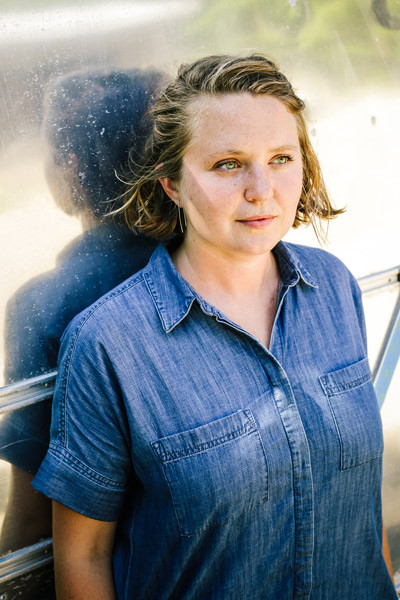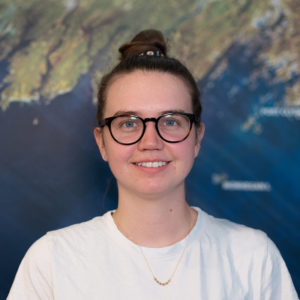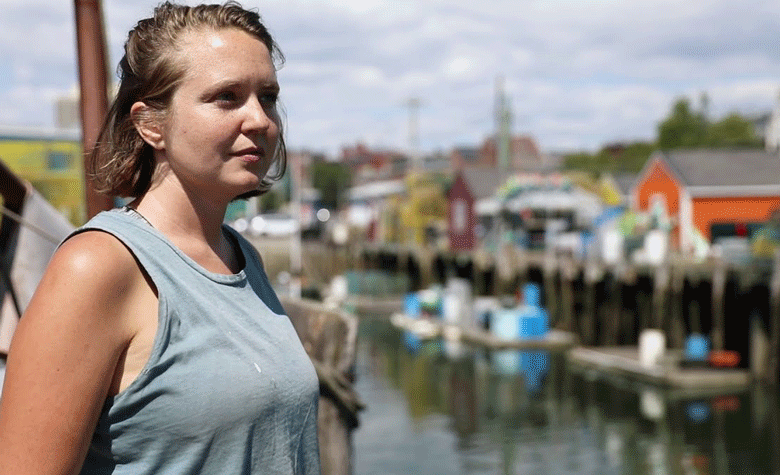Galen Koch wants you to get curious about your local dock.
Maine’s working waterfront is iconic, and foundational to the culture and economy of many island and coastal communities. From bustling wharfs to lobster co-ops, to seafarms, boat builders and mechanics, the working waterfront is made up of the infrastructure, businesses, and access points that make it possible to make a living on the water.
But these critical institutions and links to the sea—like your local dock—are easy to overlook or take for granted and they are not always guaranteed.
A shrinking workforce and lack of housing are also issues impacting many working waterfront communities.
With producer, writer, and educator Galen Koch at the helm, the Island Institute’s new iteration of its podcast “From the Sea Up” explores the past, present, and future of Maine’s working waterfronts. It examines challenges around access, infrastructure, workforce, housing, and investment in six episodes, each featuring a different community.
By uncovering the forces that have created these distinct working waterfronts, Koch sheds light on ways that Maine communities can have a hand in actively shaping—and preserving—their working coastlines.
“Trying to tell the story of a really mundane thing like a pier is challenging, but it is also really fun,” Koch explains, but there is a lot below the surface.
Through a human-centered approach, Koch connects the threads between infrastructure, people, policy, and place. The episode on Eastport explores a transition from a waterfront of empty factories to a vibrant multi-use working
coast positioned to respond to an uncertain future.
In the second episode, we hear about how the historic fishing town of Gouldsboro has grappled with questions about what kind of future it wants for its working waterfront. In the Southwest Harbor episode, Koch examines how the community has maintained and supported its commercial fisheries through zoning, municipal planning, and town decisions.

Though each working waterfront community is distinct, Koch identifies themes that have emerged visiting towns along the coast. Upkeep, funding, and investment in local infrastructure are ongoing challenges, and some obstacles and options are explored in the upcoming episode on Boothbay Harbor.
A shrinking workforce and lack of housing are also issues impacting many working waterfront communities. In the upcoming episode on Deer Isle, Koch “digs into the domino effect of the housing crisis on a hyper-local level.”
Koch grew up on Deer Isle, where she was steeped in the stories and history of her community. She remembers making fiction movies with her brother using their family’s analog video camera and was a frequent cast member in productions at the Stonington Opera House.
Pivoting from her background in theater, she went on to attend Skidmore College where she pursued the visual arts. After moving to Portland, Oregon after college, however, she found herself called back to the narratives of her home state.
“Being from Maine, I had this strong sense of place and purpose growing up,” she says. “I knew the stories of my community.” She returned to attend the Salt Institute for Documentary Studies and began creating audio stories.
In addition to telling the present-day stories of Maine’s working waterfront, Koch is also devoted to preserving the voices of the past.
For many years she has worked with Hugh French at the Tides Institute in Eastport digitizing interviews he conducted in the late 1970s and early ‘80s with folks who were employed in the former sardine industry. You can hear one of these interviews in the Eastport episode of the podcast—Alice Blaine shares about her 64 years as a fish packer.
Drawing from her deep experience with storytelling on the Maine coast, Koch reminds us that our history can be a helpful reference when navigating future changes, for Maine’s working waterfront has a legacy of adaptation, creativity, and resiliency.
“Remembering that fisheries and industries have changed and weathered it, is this really wonderful reminder of how strong coastal Maine is and has been,” says Koch.

With a deep knowledge of the coast, stories of the past close at hand, and a determination to unravel the web of political, ecological, and economic complexities that shape Maine communities, Koch asks the podcast audience to ponder the future of the working waterfront and the role we can have in shaping it.
Listen to the “From the Sea Up,” podcast at islandinstitute.org/podcast. This podcast is made possible by the Fund for Maine Islands and a partnership between the Island Institute, College of the Atlantic, Maine Sea Grant, and The First Coast.
Amy Rawn is a marketing specialist with the Island Institute, publisher of The Working Waterfront, creating and sharing content across communications platforms.





